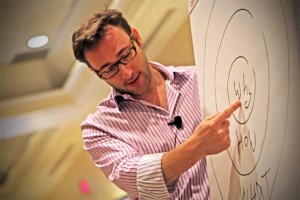 Could the answer to poor sales and limited prospects be due to the golden circle? British author and entrepreneur Simon Sinek says yes. His codification of the theory of the Golden Circle has less to do with fruit juice and more to do with defining what makes your business tick. The concept is modeled from the sectioning of the human brain: Sinek argues that humans have a natural propensity to make decisions based on the ‘gut instinct’ that comes from the part of the brain that cannot articulate using language. Thus, successful marketing relies not on the physical result or the methods of creation, but rather the instinctive ‘drive’ or ‘why’ behind the products a business is selling.
Could the answer to poor sales and limited prospects be due to the golden circle? British author and entrepreneur Simon Sinek says yes. His codification of the theory of the Golden Circle has less to do with fruit juice and more to do with defining what makes your business tick. The concept is modeled from the sectioning of the human brain: Sinek argues that humans have a natural propensity to make decisions based on the ‘gut instinct’ that comes from the part of the brain that cannot articulate using language. Thus, successful marketing relies not on the physical result or the methods of creation, but rather the instinctive ‘drive’ or ‘why’ behind the products a business is selling.
Sinek uses the classic example of Apple to prove his point. Apple does not just sell computers, nor do they simply sell the innovative design with which they are imbued with. Rather, they sell their attitude: a total appeal to user experience and a dedication to revolutionizing our lives. Sure, they are pioneers in the technological world, but their products do not differ radically from those already on the market. Rather, as Sinek argues “people don’t buy what you do, they buy why you do it”.
Sure Sinek’s codification of Apple’s success is more sophisticated than say, some bloggers desperate to pinpoint their marketing effectiveness on ‘big pictures’ or sleek design, but is his theory applicable to other industries, or is it applicable at all? If his theory is not compatible with most industries, then it contradicts his attempts to use the human brain as a metaphor. Smartly, Sinek introduces the example of Martin Luther King’s huge success at inspiring others, even though he wasn’t the only one to draw attention to the civil rights movement.
By stepping out of the realm of commercialism and physical products, Sinek’s theory appears to transcend time and industry to show that King’s ideas are no different to those of Apple. Essentially both examples are selling an idea, but the comparison seems to undermine the more abstract and complex moral decisions associated with the civil rights movement.
On the same hand, browsing through Sinek’s website you can find an online shop where you can purchase “symbolic” merchandise like engraved stainless steel key rings or cufflinks branded with Sinek’s insignia. Is this an example of someone who truly believes its not what you sell, but why you sell it?
It’s perhaps more appropriate to take the model as inspiration to work internally on goals and processes within your business. By asking your team what they think the ‘why’ is behind what they do on a daily basis, it is definitely a starting point to find better ways to motivate and inspire themselves and others. It can provide a more personal reasoning and drive behind just making a profit. But perhaps take Sinek’s prophet-like speech with a grain of salt, and do not be deterred by his strange and shiny merchandise.
Meg Ellis is a 21 year old aspiring writer and assistant to Andrew Barnes, a 22 year old entrepreneur who directs his own website design and development company, GO1. Amongst many projects, Meg and Andrew both are keen to push the boundaries of the technological and business realms.




